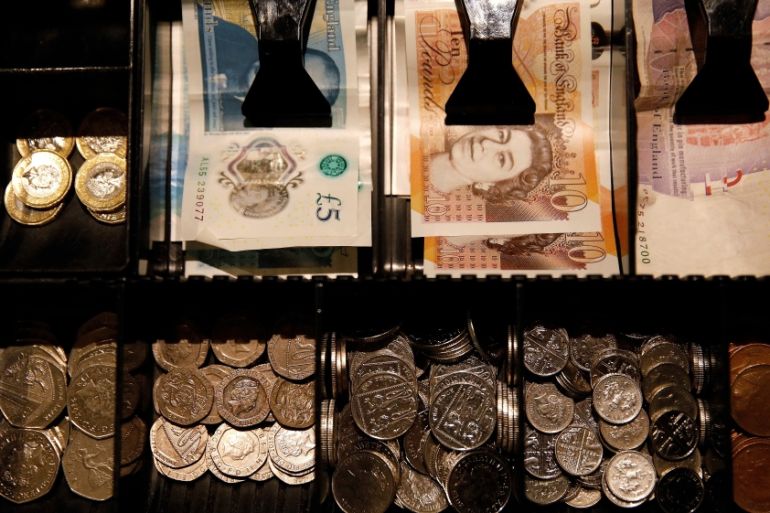Sterling steady as traders eye polls, Thursday’s BoE meeting
Bank of England will probably cut interest rates, but not this week, say analysts.

The pound was neutral on Wednesday as investors calculated the risks which the upcoming general election poses to Britain’s ability to sign a trade deal with the European Union before January 31, its new deadline to exit the bloc.
Traders also waited to see what the Bank of England (BoE) might have to say regarding the effect of Brexit on the British economy, after its meeting on Thursday.
Keep reading
list of 4 itemsIndia’s income inequality widens, should wealth be redistributed?
Biden slaps new tariffs on Chinese imports, ratcheting trade war
One of the biggest hurdles for athletes on the Olympic path: Money
Uncertainty around Britain’s departure from the EU has left a strong mark on business confidence and weak economic data makes it increasingly likely that BoE’s next move will be to cut interest rates, rather than an increase.
But money markets do not expect the central bank to cut rates in the near term until more clarity emerges on the political front.
Small British manufacturing firms are their most pessimistic since just after the Brexit referendum in 2016 as they face political uncertainty at home and trade wars abroad, according to a survey published on Wednesday.
Prime Minister Boris Johnson called for an early election to break the Brexit impasse in the hope of gaining a majority in parliament to be able to pass his Brexit deal.
But with the election set for December 12, the country will have little time to solve the impasse until it is due to leave the EU.
“There is a lot of pressure to get a trade deal done in a very short period of time and Barnier is indicating that could be tough,” said Jane Foley, senior currency strategist at Rabobank.
The EU’s Brexit negotiator, Michel Barnier, said on Tuesday that negotiations on a future trading relationship with Britain would be “difficult and demanding”, as the bloc “will not tolerate unfair competitive advantage”.
“So for sterling, there is the possibility that a lot of good news that was built into the price in October could start to seep out,” Foley said.
Pound sterling was last flat against the dollar and the euro at $1.2890 and 1.16 euro respectively. It gained more than five percent last month as traders wound off their short positions on the currency in the hope that a no-deal Brexit was averted.
Leveraged funds now hold $2.61bn of shorts, far less than the $7.81bn held at the beginning of August.
With the BoE set to hold the key benchmark rate unchanged at 0.75 percent on Thursday and the general election less than six weeks away, investors will be watching any changes in opinion poll trends closely for the significant political parties before adding positions on the pound.
The central bank must also contend with prospects of the December 12 election yielding another hung parliament, which could drag the Brexit debate beyond January 31, the third deadline for Britain to leave the EU.
“The pound’s short-term fate depends almost exclusively on polls, whereas the currency is still comparatively undervalued,” said Marc-Andre Fongern, G10 FX analyst at MAF Global Forex.
“Anything but a solid majority for the Tories could possibly weaken the British pound more significantly, as the resulting scenarios would be rather incalculable,” Fongern said.